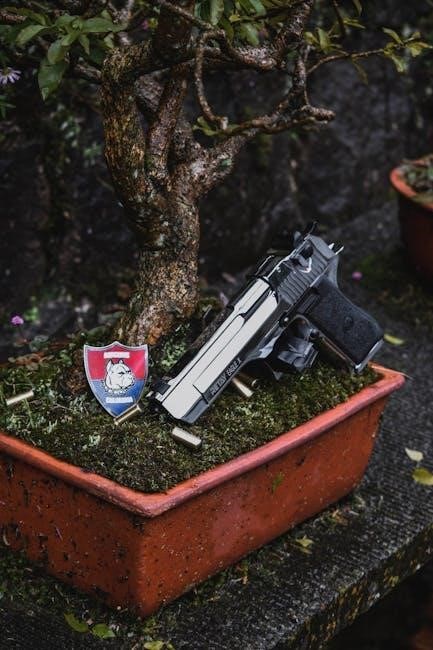
ct pistol permit application pdf
The CT Pistol Permit Application PDF is a crucial document for individuals seeking to legally carry pistols in Connecticut. It streamlines the application process‚ ensuring compliance with state laws and public safety regulations.
Overview of the Pistol Permit Application Process in Connecticut
The CT Pistol Permit Application process involves several structured steps to ensure compliance with state laws. Applicants must complete and notarize the official form‚ pay required fees‚ and undergo fingerprinting. The process also includes a background check to verify eligibility. Once submitted‚ applications are reviewed by local authorities‚ with temporary permits issued for 60 days while the full permit is processed. This system ensures public safety while facilitating legal firearm possession for qualified individuals.
Importance of the CT Pistol Permit Application PDF
The CT Pistol Permit Application PDF is a vital document for individuals seeking to legally carry firearms in Connecticut. It streamlines the application process‚ ensuring all necessary information is collected efficiently. The PDF format allows easy access and completion‚ reducing errors and ensuring compliance with state laws. By providing clear instructions and required forms‚ it helps applicants meet all legal requirements. This document is crucial for both applicants and authorities‚ facilitating a structured and transparent process.

Eligibility Requirements for a CT Pistol Permit
To qualify for a CT Pistol Permit‚ applicants must be at least 21 years old‚ pass background checks‚ meet residency requirements‚ and have no disqualifying criminal history.
Age Requirements for Applying
The minimum age to apply for a CT Pistol Permit is 21 years old. Applicants must be at least 21 to legally carry pistols or revolvers in Connecticut. This requirement ensures that only adults who meet the legal age of majority can apply. There are no exceptions for younger applicants‚ even with parental consent. The age requirement is strictly enforced to maintain public safety and adhere to state and federal firearms regulations. Proof of age is mandatory during the application process.
Background Checks and Disqualifying Factors
The CT Pistol Permit application requires thorough background checks to ensure public safety. Applicants must undergo state and federal criminal history checks‚ including a review of mental health records. Disqualifying factors include felony convictions‚ outstanding warrants‚ domestic violence restraining orders‚ and unlawful use of controlled substances. Additionally‚ any history of mental illness or involuntary commitment disqualifies an applicant. These checks are mandatory and ensure only eligible individuals receive permits.
Residency Requirements in Connecticut
Residency in Connecticut is a key requirement for obtaining a pistol permit. Applicants must provide proof of residency‚ such as a valid Connecticut driver’s license or state ID‚ and utility bills or lease agreements. Non-residents may apply if they work in Connecticut or own property in the state. Renewals for out-of-state permits must be submitted by mail. Residency verification ensures local authorities can process applications accurately‚ adhering to state-specific regulations and public safety standards.

The Application Process Step-by-Step
The CT Pistol Permit Application process involves obtaining the form‚ completing it‚ notarizing‚ paying fees‚ fingerprinting‚ and submitting to local authorities for review and approval.
Obtaining the CT Pistol Permit Application Form
The CT Pistol Permit Application Form (DPS-799-C) can be downloaded from the Connecticut Department of Emergency Services and Public Protection website or obtained from local police departments. It is essential to ensure you use the most current version of the form‚ as outdated versions may delay processing. The form is available in PDF format‚ making it easily accessible for printing. Applicants must complete the form accurately and have it notarized before submission. Additional resources‚ such as checklists‚ are available to guide applicants through the process.
Completing and Notarizing the Application
Completing the CT Pistol Permit Application requires precise and truthful information to avoid delays. All sections must be filled out legibly‚ and applicants must sign the document in the presence of a notary public. Notarization ensures the authenticity of the applicant’s identity and the accuracy of the information provided. Privacy statements within the application must also be signed. Failure to notarize or incomplete applications may result in rejection‚ emphasizing the importance of careful preparation and adherence to instructions.
Required Fees and Payment Methods
The CT Pistol Permit Application requires a $70 fee‚ payable by check‚ money order‚ or exact cash to the Treasurer‚ State of Connecticut. Additional costs include a $10 fingerprinting fee‚ paid in cash or check only. Payments must accompany the application to ensure processing. Ensure all fees are paid correctly to avoid delays‚ as incomplete payments may result in application rejection. Proper payment submission is crucial for a smooth application process.
Fingerprinting Requirements
Fingerprinting is mandatory for the CT Pistol Permit Application. Applicants must pre-enroll online and pay the state and federal fingerprinting fee of $10‚ payable by cash or check only. This step ensures a thorough background check. The fingerprinting process is part of the DPS-799-C form requirements. After pre-enrollment‚ applicants receive an Applicant Tracking Number‚ which must be brought to the fingerprinting session. Proper fingerprint submission is essential for processing the application efficiently.
Submitting the Application
Submitting the CT Pistol Permit Application involves several steps. Once completed‚ notarized‚ and accompanied by required documents‚ the application must be submitted to the local authorities. A pre-enrollment fingerprinting session and payment of fees are necessary. Applicants must include a valid government-issued ID and proof of residency. The application is typically processed after all documents are verified. Upon approval‚ a temporary permit may be issued‚ valid for 60 days‚ while the final permit is being processed.

Documents and Materials Needed
The CT Pistol Permit Application requires identification‚ proof of residency‚ and additional forms. These documents ensure eligibility and compliance with state regulations.
Identification Requirements
The CT Pistol Permit Application requires valid government-issued identification. Applicants must provide a Connecticut driver’s license or ID card. Additional forms‚ such as DPS-799-C‚ may need to be notarized. A birth certificate or passport can also be submitted. Ensure all documents are up-to-date and legible. Fingerprinting is mandatory‚ with a $10 fee for state and federal checks. Proper identification ensures eligibility and compliance with state laws‚ streamlining the application process.
Proof of Residency
Applicants must provide proof of Connecticut residency‚ such as a utility bill‚ lease agreement‚ or property tax statement. Documents must reflect the applicant’s current address and be dated within the past 90 days. This ensures eligibility under state-specific regulations. Residency verification is critical for processing the pistol permit application. Additional forms‚ like DPS-799-C‚ may require notarization. Ensure all documents are clear and legible to avoid delays. Proper residency proof aligns with state laws and public safety measures.
Additional Forms and Certifications
Beyond the main application‚ applicants must submit additional forms‚ such as DPS-799-C and DPS-129-C‚ which verify suitability and residency; These forms require notarization to ensure authenticity. Privacy statements must be signed‚ confirming the applicant’s understanding of confidentiality. Additional certifications may include proof of firearms training or mental health evaluations‚ depending on individual circumstances. These supplementary documents ensure compliance with state and federal regulations‚ verifying the applicant’s eligibility for a pistol permit. Proper completion of these forms is essential for a smooth application process.

Benefits of Obtaining a CT Pistol Permit
Besides the primary application‚ applicants must submit supplementary forms like DPS-799-C and DPS-129-C‚ which require notarization and include privacy statements; These forms ensure compliance with state and federal regulations‚ verifying the applicant’s eligibility. Additional certifications‚ such as firearms training or mental health evaluations‚ may be required based on individual circumstances. These documents confirm the applicant’s suitability and understanding of legal responsibilities‚ ensuring a thorough evaluation process for obtaining a pistol permit in Connecticut.
Right to Carry Pistols and Revolvers
Obtaining a CT Pistol Permit grants individuals the legal right to carry pistols and revolvers in Connecticut. This permit ensures compliance with state laws‚ allowing lawful possession and transportation of handguns for personal protection and recreational use. It aligns with federal regulations‚ providing a secure and regulated method to exercise Second Amendment rights. The permit is recognized statewide‚ offering consistency in enforcement and public safety standards.
Self-Defense and Personal Safety
A CT Pistol Permit empowers individuals to carry firearms for self-defense and personal safety. It enables lawful citizens to protect themselves and their families‚ fostering a sense of security. The permit ensures that individuals can legally possess handguns for protection‚ aligning with the right to self-defense. This authorization is particularly valuable in situations where personal safety is compromised‚ providing a legal means to respond to threats. The permit process includes rigorous background checks‚ ensuring public safety while safeguarding individual rights.
Reciprocity with Other States
A CT Pistol Permit offers reciprocity with certain states‚ allowing permit holders to carry firearms legally while traveling. Connecticut’s strict gun laws mean its permits are recognized by states with similar or less restrictive regulations. This reciprocity is beneficial for residents who travel frequently‚ ensuring they can exercise their right to carry for self-defense across state lines. However‚ it’s crucial to verify each state’s specific laws and requirements before carrying a firearm outside Connecticut.

Challenges and Common Issues
Processing delays and high fees are common challenges. The $70 application fee and lengthy waits for approval can be a financial and time burden for applicants.
Processing Time Delays
Processing times for CT pistol permit applications are often longer than anticipated. Factors such as high application volumes and administrative backlogs contribute to delays. Additionally‚ the thorough nature of background checks and the need for precise documentation can slow down the process. Applicants are advised to submit their applications well in advance and regularly follow up with local authorities to ensure timely progress. This ensures that all requirements are met without unnecessary delays.
High Volume of Applications
Connecticut has experienced a significant surge in pistol permit applications‚ particularly in rural towns. This increase has strained local police departments‚ leading to extended processing times. The rise in demand is attributed to heightened concerns for personal safety and self-defense. Authorities are working to manage the influx‚ but the high volume continues to challenge resources. Applicants are encouraged to submit their forms early and stay patient as departments strive to maintain efficiency despite the overwhelming demand.
Cost and Financial Burden
Obtaining a CT pistol permit involves several fees‚ including a $70 application fee and additional costs for fingerprinting. Payments must be made by check‚ money order‚ or exact cash. These expenses‚ combined with potential notarization fees‚ can create a financial burden for applicants. While the fees are standardized‚ they may still pose challenges for individuals with limited budgets‚ highlighting the economic barriers to accessing a pistol permit in Connecticut.

Temporary State Pistol Permit
The Temporary State Pistol Permit is issued for 60 days‚ allowing applicants to carry pistols while their main application is processed. It is granted upon local authority approval.
60-Day Temporary Permit
The 60-Day Temporary Permit offers individuals immediate authorization to carry pistols while awaiting their permanent permit. This provisional license is granted by local authorities‚ ensuring applicants can exercise their rights without delay. It serves as a bridge‚ allowing lawful possession and carriage of firearms during the processing period. The temporary permit is issued upon meeting initial criteria and is valid statewide. It provides a practical solution for those needing timely approval. This permit is essential for self-defense and convenience.
Conditions for Issuance
To qualify for a 60-Day Temporary Permit‚ applicants must meet specific criteria. They must be at least 21 years old‚ pass state and federal background checks‚ and be a Connecticut resident. The application must be completed accurately‚ notarized‚ and submitted with required fees. Applicants must not be prohibited by state or federal laws from possessing firearms. Additionally‚ they must demonstrate a need for the permit‚ such as self-defense. Meeting these conditions ensures the permit is issued responsibly‚ balancing public safety with individual rights.

Legal and Legislative Considerations
Connecticut’s pistol permit process is governed by state laws and federal regulations‚ ensuring compliance while respecting Second Amendment rights. Staying informed on legal updates is crucial.

Connecticut State Laws Governing Pistol Permits
Connecticut state laws regulate pistol permits through specific statutes like C.G.S. 29-28 and 29-36‚ ensuring public safety while balancing Second Amendment rights. These laws outline eligibility criteria‚ including age requirements and background checks‚ to determine suitability for carrying firearms. The process involves thorough vetting by local authorities and state agencies‚ ensuring compliance with both state and federal regulations. Applicants must meet strict standards‚ and any disqualifying factors‚ such as criminal history or mental health concerns‚ are meticulously reviewed. This legal framework aims to protect public safety while respecting lawful firearm ownership;
Federal Legislation and Implications
Federal legislation plays a significant role in shaping Connecticut’s pistol permit process. Laws like the Brady Handgun Violence Prevention Act and federal prohibitors (18 U.S.C. § 922) influence eligibility‚ requiring thorough background checks. Applicants must comply with federal firearms regulations‚ including age restrictions and prohibitions for certain criminal or mental health histories. Additionally‚ federal reciprocity agreements affect permit recognition across state lines‚ though Connecticut maintains strict control over its own permitting system. These federal standards ensure alignment with national gun safety priorities while respecting state-specific requirements.

Public Perception and Controversies
Public perception of CT pistol permits is divided‚ with debates on gun control and safety. Controversies arise over permit accessibility‚ urban vs. rural demand‚ and legislative changes.
Increased Demand for Pistol Permits
Connecticut has seen a significant surge in pistol permit applications‚ particularly in rural towns. This rise is attributed to concerns over personal safety and shifting perceptions of gun ownership. Small towns like Bristol and Southington reported drastic increases‚ with applications spiking from 30 to over 100 in a single month. This trend reflects broader national discussions on self-defense and firearm access‚ prompting many to seek permits amid growing demand for personal security measures.
Debates on Gun Control in Connecticut
Connecticut has been at the forefront of gun control debates‚ with strict laws governing pistol permits. Recent legislative efforts aim to encourage other states to adopt similar handgun permitting systems. Proponents argue these measures enhance public safety‚ while critics raise concerns about infringing on Second Amendment rights. The state’s approach balances regulation with individual freedoms‚ reflecting broader national discussions on firearm access and responsibility. These debates continue to shape Connecticut’s policies and its reputation as a leader in gun control legislation.
The CT Pistol Permit Application PDF simplifies the process‚ ensuring compliance with state laws. It balances public safety and individual rights effectively.
Final Thoughts on the CT Pistol Permit Application Process
The CT Pistol Permit Application process is designed to ensure public safety while granting individuals the right to carry firearms responsibly. The structured process‚ supported by the CT Pistol Permit Application PDF‚ provides clarity and efficiency for applicants. It is essential for applicants to thoroughly review and comply with all requirements to avoid delays. By understanding the process and preparing all necessary documents‚ individuals can navigate the system smoothly. This framework balances legal standards with individual rights‚ fostering a safe and regulated environment for firearm ownership in Connecticut. Proper preparation and attention to detail are key to a successful application.
Resources for Further Assistance
For further assistance with the CT Pistol Permit Application‚ applicants can visit the official Connecticut State Police website or contact the Department of Emergency Services. Additional resources include local police departments‚ which often provide guidance and workshops. The DPS-799-C form and related instructions are available online. Applicants can also consult with firearms attorneys or training professionals for clarification on legal requirements. Staying informed through official channels ensures a smooth application process and compliance with state regulations. Regular updates and FAQs are provided to address common concerns and changes in legislation.
Leave a Reply
You must be logged in to post a comment.